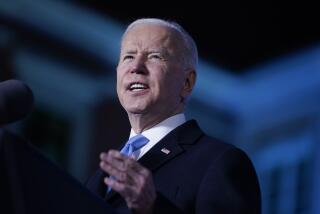Revenue-Raising Tax Plan Unveiled by Rostenkowski
- Share via
WASHINGTON — House Ways and Means Committee Chairman Dan Rostenkowski (D-Ill.) on Tuesday laid out his own road map for raising $5.3 billion in additional revenue next year, proposing among other things to hit pipe smokers and tobacco chewers.
His plan also calls for a continuation of current taxes on airline tickets and telephone bills, for limits on a variety of corporate tax breaks and for a higher ceiling on Social Security taxes.
The package, which meets the budget target established by Congress earlier this year, contained few surprises.
Lawmakers on the tax-writing committee are not expected to make major changes in Rostenkowski’s specific proposals. However, they are likely to recommend tackling such other issues as expanding child-care tax benefits, reducing the surtax that is scheduled to pay for Medicare coverage for catastrophic illnesses and cutting taxes on capital gains. Although Rostenkowski said that he hopes to complete action this week, the debate is expected to continue into next week and possibly longer.
Rostenkowski’s proposal contains almost no changes directly affecting individuals.
One of the few that would affect individuals would sharply boost the tax on pipe tobacco, snuff and chewing tobacco. Another would raise the current $48,000 ceiling on wages subject to Social Security tax by roughly $1,000 above the normal annual inflationary increase. That action would add an estimated $1.1 billion to Social Security taxes paid by affluent workers when fully implemented in fiscal 1991. But benefits would also increase for retirees, eventually costing the government more in outlays than the revenue gained from the change.
The plan also calls for extending the 3% tax on telephone calls for at least one more year, but few lawmakers expect that the tax will be allowed to expire. Similarly, current law would cut in half various aviation taxes, including levies on tickets, fuel and cargo shipments. Rostenkowski’s proposal would keep the taxes at their present levels for another year.
As he had proposed earlier, Rostenkowski took aim at the increasingly popular corporate practice of establishing employee stock ownership plans, or ESOPs, to help ward off hostile takeovers.
The plan to eliminate the existing 50% exclusion for interest payments used to finance ESOPs is the biggest revenue generator in the package. It would add an estimated $1.27 billion in revenue for fiscal 1990, which begins on Oct. 1, and $10.18 billion over the next five years.
Rostenkowski’s ESOP proposal, which he recommended be retroactive to June 7, could affect both Xerox Corp. and Delta Airlines, which both proposed ESOPs on Monday as part of their own defenses against potential takeovers. Although Xerox said it did not think legislation would affect its ESOP plan, the company would need a special exemption to avoid the proposed measure.
Also hitting ESOPs was another Rostenkowski recommendation that would repeal a deduction allowed employers for certain dividends on securities held by an employee stock plan. That would raise $368 million next year and $3 billion over five years.
The Bush Administration also had recommended keeping the airline and telephone taxes and suggested roughly $500 million in minor corporate tax measures, contending that none of its proposals violate President Bush’s “no new taxes” pledge. The Administration, however, may oppose Rostenkowski’s proposal to impose higher taxes on pipe smokers and snuff users and a plan to limit tax deductions on Third World bank loans, committee aides said.
‘Committed to $5.3 Billion’
Rostenkowski’s proposal, which would raise an estimated $31.9 billion over the next five years, does not include any revenues to maintain a number of popular tax credits that are supposed to expire this year, such as those for low-income housing, mortgage bonds and corporate research and development.
“If my colleagues want to do anything to raise revenues (to extend expiring tax breaks), that’s up to them,” Rostenkowski told reporters. “I’m just committed to the $5.3 billion.”
Rostenkowski, as expected, did not include any proposal to change the capital gains tax. However, the Bush Administration is expected to press the committee to lower the tax on profits from investment in stocks, bonds and similar assets.
More to Read
Get the L.A. Times Politics newsletter
Deeply reported insights into legislation, politics and policy from Sacramento, Washington and beyond. In your inbox twice per week.
You may occasionally receive promotional content from the Los Angeles Times.










